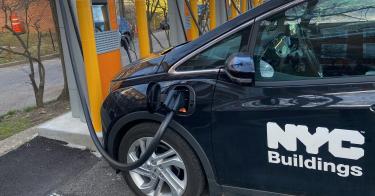New proposed regulations on automobile emissions from the Environmental Protection Agency would require new car sales to be 60% electric by 2030 and 67% by 2032, compared to fewer than 6% in 2022. EPA is also planning new rules for power plants, driving up the costs of the electricity needed to charge these vehicles. These rules would raise driving costs for Americans and strengthen China’s economy, because China makes 80% of the world’s electric batteries.
Here are 10 reasons why EPA should not proceed with the rule.
New electric vehicles cost more than gasoline-powered vehicles. The electric version of the base version of the Ford 150 pickup truck, the best-selling vehicle in America, costs an additional $10,000. Tesla’s base prices start at $39,000 for a Model 3 and go up to almost $100,000 for a Model X.
Charging will cost more. At the same time the EPA is issuing new rules for automobile emissions, it’s also planning new rules for emissions from power plants, The New York Times reports. According to the Times, EPA will regulate carbon emissions from both new and existing natural gas and coal-fired power plants, and require carbon capture systems or a switch to hydrogen fuels.
It won’t be cheap. These systems for capturing carbon are costly and will be passed on to consumers in the form of higher electricity rates. Drivers will find it more expensive to use electricity for all purposes, including charging their electric vehicles.
>>> Emissions-free Electric Vehicles Are a Fantasy
Used electric vehicles will be hard to find. Three-quarters of vehicles sold are previously owned. In 2019, the last year for which complete data on used car sales is available, 41 million used cars were sold and 13 million new cars. But people don’t want to buy used electric vehicles, because it’s difficult to evaluate how long the battery will last. Replacing an EV battery can cost $10,000 to $15,000.
Mandating electric vehicles would reduce Americans’ standard of living. Back in the early 1900s, when Henry Ford started producing cars, only rich Americans could afford them. Throughout the 20th century, however, cars became less expensive, and soon many households could afford not one but two. Yet cars are already becoming more expensive, and the proposed rule accelerates that trend, taking America back a century, where new cars will be only for the rich.
Electric vehicles take 45 minutes to recharge. Recharging an electric vehicle can take 45 minutes, compared to 5 minutes to fill up with gas. If someone is in front of you at the charging station, the wait can double. Most people don’t want to let their EV battery go below 20%, and the charging rate goes down when it is charged over 80%. In most large cities, such as New York City, many do not have access to indoor garages for overnight charging. Using charging stations on the street, if available, risks theft of expensive charging cables.
Battery-powered vehicles lack sufficient range to satisfy most customers. Although 60 to 70 miles of range is enough for most trips, people buy cars for all circumstances, including vacations and cold weather. Batteries lose 20% to 40% of their range in cold climates. That’s one reason only 380 North Dakota residents chose EVs in 2021 and Alaska had 1,300.
Yet the Department of Transportation plans to spend $26 million for charging stations in North Dakota, or $68,000 per registered EV. Alaska, with $52 million allocated for charging stations, will get $40,000 per EV.
Electric vehicles harm the environment through mining for minerals. Minerals such as lithium and cobalt are essential for batteries. Mining for these minerals is energy-intensive, and the Chinese Communist Party (CCP) has facilitated access to domestic and foreign minerals for battery production. Lithium is mined in western China’s Qinghai Province, aided by government funding, and China purchases cobalt for electric batteries from Kisanfu, in the Democratic Republic of Congo.
Electric vehicles are not emissions free. In addition to batteries made with fossil fuels, increased electricity demand places additional stress on the electrical grid, as California has found out from rolling blackouts. In its proposal, the EPA discusses the benefits of reducing pollutants from cars, but higher emissions will come from the electricity generated to recharge the cars. This electricity is made with natural gas and coal, because wind and solar powers a small share of America’s power. The EPA admits that “We expect that in some areas, increased electricity generation would increase ambient SO2, PM 2.5 , ozone, or some air toxics.”
>>> EPA’s Latest Act of Soft Despotism Against the American People
Electric vehicles will make America weaker and China stronger. Rather than using its own oil and natural gas resources, America will depend on batteries from China, which makes 80% of the world’s batteries. America should not rely on China, a totalitarian regime which uses forced labor and coal-fired power plants, for a vital element of transportation.
No effect on climate. This mandate of a ten-fold increase in sales of electric vehicles would affect Americans and manufacturers with negligible results for the climate because China has not committed to reducing emissions until 2027. In fact, China continues to build coal-fired power plants. Consider that America has 225 coal-fired power plants, and China has 1,118 (half of all the coal-fired plants in the world).
China has increased carbon emissions by over 5,000 million metric tons over the past 16 years. In contrast, America’s carbon emissions have declined by over 1,000 million metric tons over the same period due to the use of clean natural gas.
New EPA regulations, driven more by politics and virtue-signaling than economics and emissions reductions, will raise vehicle costs for Americans, give up energy independence to China, and have no environmental benefits. The Biden administration should withdraw its proposal.
This piece originally appeared in Forbes https://www.forbes.com/sites/dianafurchtgott-roth/2023/05/01/10-reasons-why-epas-new-ev-regs-weaken-america-strengthen-china/?sh=2dc01484720c



